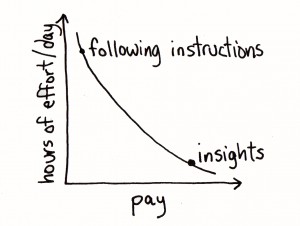In his absolutely fascinating book Linchpin, Seth Godin, writes “brilliance comes in short bursts, ordinary is a continuum.” At least that the quote according to my journal and since I was making some notes on his work at the time I assume it was him. He was talking about the fact that most of the things Richard Branson does in a day are mundane and most people could do them just as well as him. Except, Godin adds, during those “five minutes he creates billions of dollars’ worth of value every few years, …… Branson’s real job is seeing new opportunities, making decisions that work, and understanding the connection between his audience, his brand, and his ventures.” (page 51.).
For the record, Godin is talking about (to) employees in this context but what he’s suggesting applies to anyone in any organization. He illustrates his point with the following figure which reflects the idea that “valuable” insights don’t take up a lot of time (although it could be very reasonably argued that getting to a point where you can have such insights may come from a lifetime of experience) even though they pay a lot because they are inherently valuable.
In contrast, to create an aggregate of value by simply following instructions in an almost mindless fashion is very time consuming but does not pay much because anyone with a systematized set of instructions and some tools can do it.
In the course of thinking about what Godin is saying several things occurred to me. First, it reminded me that when we assign talented people to low level tasks we may be getting some value from them in the form of the grunt work output they produce but we may also be denying ourselves the opportunity that could come from insights they may otherwise have if we gave them more challenging work to do. This is one of the reasons I have always put forward for adopting an aggressive delegation policy.
Second, much of the grunt work that needs to be done in accounting firms comes from “grunt level” clients. By that I mean clients who only want low level work done; they are clients who are not really interested in “insights” and who therefore offer you limited opportunity to create significant value which in turn means the only way you can grow your firm with this type of client is to get more of them and that mandates getting more talent to do the grunt level work and then you have difficulty retaining (or at least engaging) your team members.
Third, you don’t have to be terribly smart to do low level work. So when you put two people together to do that type of work and one of them is actually super smart and the other is really average, it will be almost impossible to tell them apart. But when a difference is noticeable it will probably be that the “smart” person is a trouble-maker because s/he’s bored stupid. If this happens you may make the horrible mistake of getting rid of your talent and retaining the compliant idiot. This is a clear and free way to win the race to the bottom.

